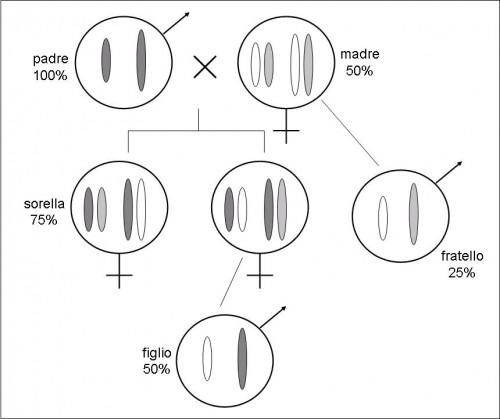Davide Bertè 18 Ottobre 2011
Negli Imenotteri (ad esempio api e formiche) si verifica una condizione peculiare: si ha una netta divisione in caste con operaie sterili e caste riproduttrici (in un alveare è solo l’ape regina che si riproduce). Si parla allora di eusocialità.

Gli insetti eusociali, con la loro suddivisione in caste riproduttive, hanno a lungo rappresentato uno dei maggiori enigmi per la teoria dell’evoluzione, tanto che lo stesso Darwin (1859) lo definì come: “una difficoltà specifica, che a tutta prima mi parve insuperabile e addirittura fatale per l’intera teoria”. Darwin si riferiva alle formiche, e due erano i problemi presi in considerazione: la sterilità delle operaie e la loro differenza morfologica rispetto alla regina.
Sorprendentemente “la difficoltà maggiore sta nel fatto che le formiche operaie sono molto diverse quanto a struttura sia dai maschi che dalle femmine fertili (…) oltre che nell’istinto”, mentre la sterilità delle operaie è semplicemente considerata come “una difficoltà preliminare”, sbrigativamente risolta considerando che se “fosse vantaggioso per la comunità avere, ogni anno, un certo numero di individui atti al lavoro ma incapaci di procreare, non vedo perché debba essere tanto difficile per la selezione naturale riuscire nell’intento”. E’ chiaro da queste parole che, quello che fu poi considerato il vero problema dai neodarwinisti, non fu tale per Darwin (Cronin, 1991).
Ma se la trasmissione dei geni alla generazione successiva è una condizione essenziale per il mantenimento della specie, perché così tanti individui dovrebbero rinunciare a riprodursi per dedicarsi unicamente ad allevare le larve prodotte dalla madre? Questo tipo estremo di altruismo trova una solida spiegazione nella teoria della selezione per parentela o kin selection (Fisher, 1930; Haldane, 1932; Hamilton, 1963): aiutando i parenti stretti, con i quali si ha una buona probabilità di condividere gli stessi geni, si favorisce anche la diffusione dei propri geni.
Questo sembra essere particolarmente vero per le caste operaie negli Imenotteri (Hamilton, 1964). In questo ordine infatti la riproduzione è di tipo aplodiploide, ovvero i maschi, che nascono da uova non fecondate, hanno solo una copia del corredo genetico e si dice che sono aploidi (n), mentre le femmine, che nascono in seguito a fecondazione dell’uovo, hanno due copie e si dice che sono diploidi (2n).

Ne consegue che, mentre i gameti femminili contengono soltanto metà del patrimonio genetico della madre, quelli maschili sono identici tra loro, poiché il padre può fornire una unica copia del suo DNA. Ogni figlia riceverà quindi una copia del proprio corredo genetico dal padre, condiviso con le sue sorelle, ma solo metà dei geni della madre, e avrà così la probabilità di condividere i ¾ dei propri geni con una sorella, metà con la madre o con un figlio/a e solamente ¼ con un fratello. Una operaia avrà quindi maggiore probabilità di diffondere i propri geni allevando una sorella piuttosto che generando dei figli.
Questo meccanismo favorirebbe la socialità tramite la fissazione di alleli “altruistici” (Morpurgo & Babudri, 2005). Questo potrebbe spiegare la ragione per cui gli Imenotteri, benchè siano solamente il 13% degli Insetti conosciuti, abbiano evoluto indipendentemente la eusocialità almeno undici volte, mentre nel restante 87% solamente gli Isotteri (Wilson, 1971; Hölldobler & Wilson, 1990) e i Tisanotteri (Crespi & Mound, 1997) hanno seguito vie simili.
Non tutte le famiglie di Imenotteri però presentano eusocialità, anzi in molte di esse si ritrovano tutti i gradi intermedi di vita sociale, come per esempio nei Crabronidi, cui appartiene Cerceris. Infatti, in questo genere in particolare, sono presenti sia forme solitarie che coloniali, con interessanti varietà di comportamenti sociali (O’Neill 2001).
La divisione del lavoro tra individui che condividono il medesimo nido e siano sottoposti a particolari pressioni selettive, come per esempio a quelle provocate da una carenza di risorse o da un elevato rischio di parassitismo, sembra essere inevitabile: “il gradino dalla vita solitaria a quella sociale non richiede nuovi geni o lo sviluppo di nuovi sistemi neurali o di nuovi comportamenti. Gli insetti solitari hanno già tutte le componenti comportamentali per sviluppare il comportamento sociale” (Page & Erber, 2002). Questa teoria sembrerebbe confermata da esperimenti come quello di Sakagami & Maeta (1987) che, forzando una femmina di ape carpentiera normalmente solitaria, Ceratina flavipes Smith, a condividere il nido con altre conspecifiche, hanno osservato come questa sviluppasse un comportamento e dei ruoli sociali. Ovviamente questo avviene in condizioni di laboratorio e non in natura ma, ciò nonostante, lascia intravedere interessanti implicazioni.
Dall’osservazione comparativa di diversi tipi di socialità potrebbe inoltre essere possibile trarre delle ipotesi sullo sviluppo dei sistemi sociali negli imenotteri, la cui diversità è il prodotto di almeno una decina di linee evolutive indipendenti (Melo, 1999).
mi piace un sacco l’idea degli alleli “altruistici”… ne devo aver letto qualcosa di molto generico su un blog (mi pare l’Huffington Post) in un articolo che non era di vera e propria divulgazione scientifica e mi son ripromessa di leggerne di più… ancora mai fatto! c’è altro dopo il 2005 (la tua citazione più recente in merito a questo)? ciao
Ciao Caterina!
In effetti quella che ho voluto esporre qui è solo l’ipotesi “classica” per spiegare il fenomeno. La situazione è molto complessa e la teoria della kin selection ne è una parte storicamente importante. La sociobiologia, così come esposta da E.O Wilson, è stata molto discussa ed è difficile da estendere ad altri campi; tuttavia, per l’eleganza della spiegazione, rimane senza dubbio una delle ipotesi a cui sono più affezionato.
La formulazione originale pecca sicuramente di un eccesso di determinismo e i nuovi scritti di Wilson mettono l’accento sull’importanza dei caratteri emergenti, cercando di tenere conto di una serie di casi particolari.
L’opera più recente che tratta dell’argomento credo sia il monumentale “Il superorganismo” di Hölldobler e Wilson, uscito in Italia per i tipi di Adelphi nel 2011.
Grazie Davide!
Vorrà dire che, quando avrò tempo, grazie al tuo consiglio mi procurerò l’opera monumentale!